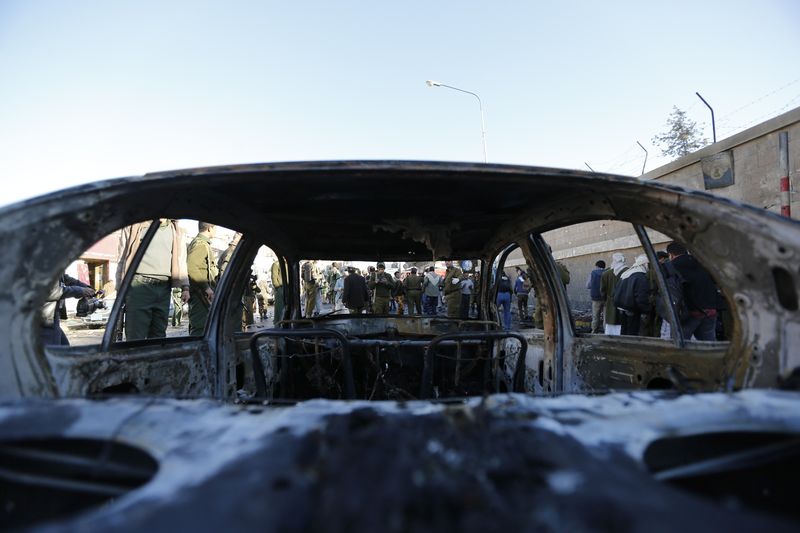By Mohammed Ghobari
SANAA (Reuters) - A car bomb exploded outside a police college in Yemen's capital Sanaa on Wednesday, killing about 30 people and wounding more than 50, police sources said, underscoring the country's deteriorating security and a persistent al Qaeda threat.
Sectarian conflict after a 2011 popular uprising that led to a change of government and splits in the army has worsened since September when the Shi'ite Muslim Houthi militia seized Sanaa.
Al Qaeda in the Arabian Peninsula (AQAP), one of the Sunni militant group's most active wings, had staged increasing numbers of attacks across Yemen before the Houthi advance and has carried out more bombings and shootings since.
There was no immediate claim of responsibility for Wednesday's bombing. Al Qaeda has in the past claimed they were behind similar attacks.
The victims from the latest blast included students at the college and people waiting in line to enrol with the police, the police sources said, as well as passers by.
The explosion was heard across the city and a large plume of smoke was visible near the college in a heavily congested part of the city near the central bank and the defence ministry.
"The situation is catastrophic. We arrived to find bodies piled on top of each other," a paramedic at the scene told Reuters as ambulances took casualties away.
"We found the top part of one person yelling, while his bottom half was completely severed."
A policeman told Reuters that another car had been passing as the bomb went off and was set on fire along with everyone inside.
The Interior Ministry said it was halting registration at the police college, which takes place every year, for a week.
Western and Gulf Arab countries fear that further instability could weaken the country's government, giving AQAP more space to plot attacks outside Yemen's borders. Yemen shares a long border with major oil exporter Saudi Arabia.
Yemen's army has launched several concerted campaigns to dislodge al Qaeda with the help of U.S. drone strikes, but the militants have proved capable of entrenching themselves in largely lawless parts of the Arabian Peninsula country where it has sympathy from some Sunni tribes.
On Jan. 1 a suicide bomber killed at least 26 people at a cultural centre in the central Yemeni city of Ibb in an attack that appeared to target the Houthi Shi'ite Muslim militia that seized the capital in September and advanced into other areas.

Most attacks in the past four years have targeted Yemen's security infrastructure. A suicide bomber killed more than 90 people in May 2012 at a military parade, and a coordinated assault on a military hospital a year ago killed more than 50.
(Writing by Angus McDowall and Yara Bayoumy; Editing by Louise Ireland)